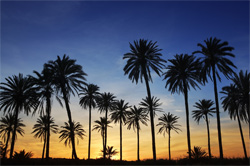Mining, money, palm trees and protests
Tuesday, December 13, 2011

Miners face renewed opposition in developing countries
Costa Rica’s Supreme Court last week prohibited Canadian-based Infinito Gold from developing its Crucitas property.
Infinito failed to meet environmental standards, said the court.
On the same day, 150 artists and writers from around the world, including Nobel literature laureates Tomas Transtromer of Sweden and Jean-Marie Le Clezio of France, urged Mexican President Felipe Calderón to cancel a concession, owned by First Majestic Silver, also based in Canada.
The company is planning to excavate land, which - according to legends of the native Huichol people - is the birthplace of the sun.
Two days earlier, Peruvian protestors, concerned about potential water pollution, caused the suspension of a $5 billion project by Colorado-based Newmont Mining Corporation, the world’s biggest gold extractor.
The Peruvian activists, along with the Nobel authors and the Costa Rican Supreme Court may be right, in opposing these and other projects.
Mining may not do much to help developing countries.
Unfortunately, not mining isn’t a solution, either…
The tropical town is pretty.
Palm trees sway in the park.
It’s always summer.
But in parts of town, gangsters rule the streets.
Many of the people are poor.
They can’t go to a doctor, when they get sick.
Some of them die young.
One day, a group of miners comes to town.
The miners tell the people that under the town there is a mass of gold, worth a fortune.
The miners say that they have experience getting valuable metals out of the ground, and selling them to people all over the world.
If the town lets them extract and sell the gold, they will give the people half the profit.
The plan sounds good.
With money from the mine, rich families could hire people, to help them manage eco tourism projects and organic farms, which they see as the wave of the future.
If young men and women had decent jobs, they wouldn’t turn to crime.
With its share of the profits, the mayor’s office would provide services for poor people.
Their children would go to a school, which has a computer, and which serves a hot lunch.
Anyone who is sick, could see a doctor.
The visitors say that they have mines in other towns, and that none of them has caused damage to land or water.
They promise that when the mine is finished, they will cover it with earth, and plant shade trees, where birds sing.
But some of the townspeople have second thoughts.
They don’t have enough training, to know whether or not the mine is likely to damage their fields and farms.
Mining uses acid to separate gold from the rocks, which come out of the ground.
If acid were to spill into the river, which passes near the town, fish and plants would die.
The miners might clean up the mess.
Or they might disappear the same night.
No one can be sure.
After all, no one knows them.
Even if the mine were to work well, poor people could end up getting little or no money.
The town’s elite might hire only manicurists and pool boys, at low wages.
Many people distrust the mayor.
They think that he is tough and crooked, and that he and his friends would steal everything they can get their hands on.
In the end, things stay as they are.
The town is pretty.
The streets may be dangerous, and some people die young.
But palm trees sway in the evening breeze.
It’s always summer.
Fred Blaser
Chairman
Republica Media Group
